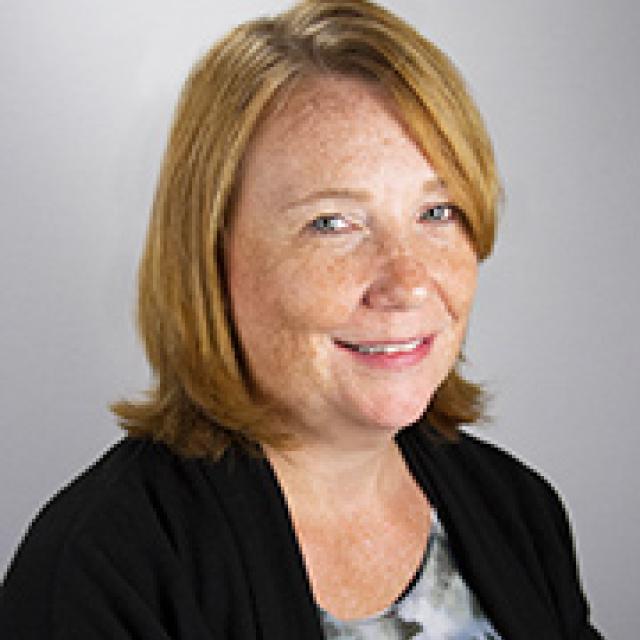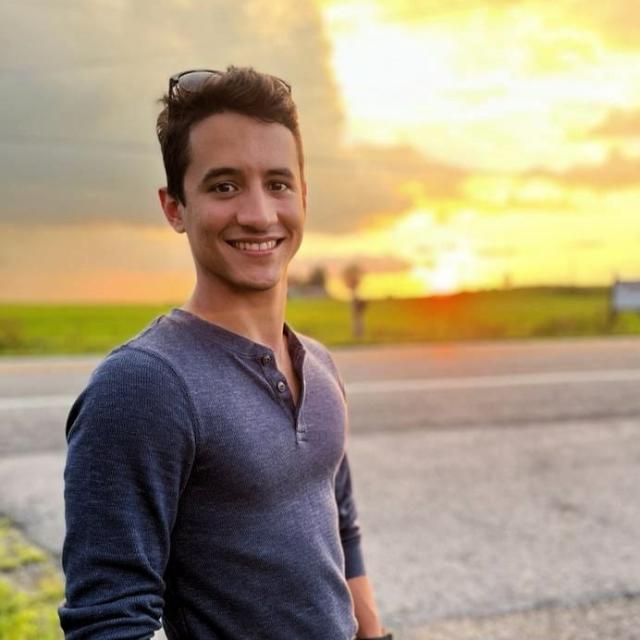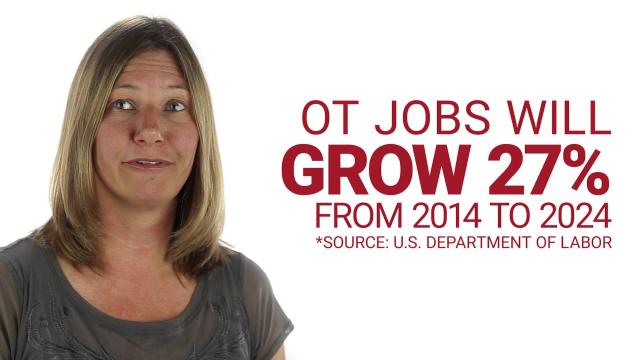
Occupational Therapy (MS)
- School of Health Professions
- Occupational Therapy
- 3-Year
- 74-75 Credit Hours
Overview
Occupational therapy helps individuals regain and build skills that are important for their health, well-being, safety, and daily living.
As an occupational therapist, you'll work with people of all ages who have various physical, developmental, social or emotional challenges. You will help them develop the skills to lead independent, productive and satisfying lives.
D'Youville's master of science degree program includes courses in occupational therapy theory and practice, six months of supervised fieldwork, and research.
Upon graduation from our ACOTE-accredited program, you'll be prepared to take the National Certification Examination for Occupational Therapists.
Learn more about the Occupational Therapy program on our program homepage.
Why Choose D'Youville?
- Receive individual attention from dedicated faculty mentors and clinicians at the forefront of their field.
- Studies show that teamwork across clinical specialties improves patient outcomes. D'Youville's unique interdisciplinary education lab offers the opportunity for you to practice treating patients (played by actors) alongside a team of students from 7 other healthcare majors at D'Youville — all under the supervision of a skilled instructor.
- Learn in classes, labs, and seminars sized for effective teaching and mentoring.
- Gain practical experience through our strong focus on clinical field experience. D'Youville has developed relationships with 300 clinical fieldwork sites in a wide array of settings, facilities, and treatment protocols.
- Our students' certification exam scores consistently meet or exceed the national average.
- Eligible OT students can apply to the Alpha Rho Chapter of Pi Theta Epsilon, a National Honor Society for Occupational Therapists and Students. Our Chapter is active and hosts a fall and spring event each year.
What you'll gain:
- A degree that focus on both coursework and fieldwork
- Research skills that will translate to the professional world
- Join a degree program with consistently high career placement rates
Fieldwork Education
The Department of Occupational Therapy has clinical fieldwork agreements with over 400 hospitals, school systems, rehabilitation centers, mental health sites, nursing facilities, and community-based centers in select states across the U.S.
The goal of fieldwork education is to prepare the students to be well-rounded, entry-level practitioners.
Launch Your Career with Confidence
Admissions Requirements
OTCAS: The Occupational Therapy Department at D'Youville University participates in the Occupational Therapist Centralized Application Service, known as OTCAS. Applicants to the master's in occupational therapy program must apply online through the OTCAS application. To apply to D'Youville OT program visit OTCAS at www.otcas.org and select D'Youville College as one of your designations.
- Application Deadline: applications must be complete and verified by OTCAS prior to November 30th, for fall semester start to be considered for admission.
Program Requirements
Admission to a the occupational therapy program is based on the qualifications of each individual student. A GPA of 3.0 (equivalent to a B) or better is the minimum requirement for acceptance into the program.
In addition, applicants to the master's in occupational therapy must
present the following:
- Completion of a baccalaureate degree prior to the start of course work. Official transcripts from all colleges/universities attended are required for admissions consideration.
- Two letters of recommendation - one academic and one professional (or two academic). References from OT observations will not be accepted.
- Evidence of capability to succeed in a graduate program, as shown by a cumulative undergraduate G.P.A. of at least a 3.0 (based on a 4.0 system).
- Completion of the following prerequisite courses with a grade of C or better prior to the start of the first semester of course work. Courses must be at least three credits and pass/fail grades are not accepted:
- General or Developmental Psychology (must cover life span development)
- Abnormal Psychology
- Sociology or Social Anthropology
- Applied Statistics
- Human Anatomy and Physiology (I and II with labs or six to eight credits of a combination of other biology courses that focus on anatomy and physiology such as Comparative Primate Anatomy, Comparative Mammalian Anatomy and Physiology, Human Anatomy and Human Physiology, Anatomy and Physiology I and II, or their equivalents, at least one of which is a lab course, as determined by the registrar and the department.
Upon Admission
Admitted students are required to take a writing skills assessment. If the results
indicate the need for remediation, students must follow through with
recommendations. In addition, the faculty expects students to have basic computer skills for word processing, e-mail and online database and library searches.
Careers
Our program prepares you for general occupational therapy practice.
Employment of occupational therapists is projected to grow 27 percent from 2014 to 2024, according to the Bureau of Labor Statistics. Donna Brzykcy, MS, OTR/L, a clinical assistant professor and Academic Fieldwork Coordinator at D’Youville, explains why D’Youville’s ACOTE-accredited three-year professional program leading to a Master of Science (MS) degree graduate program is the ideal choice for students.
An Occupational Therapist's Role
As an occupational therapist, you'll work with people of all ages who have various physical, developmental, social or emotional challenges. You will help them develop the skills to lead independent, productive and satisfying lives.
Occupational therapists work in a variety of healthcare settings, including: acute hospital, rehabilitation, and orthopedic settings.
Other major employers of occupational therapists are hospitals, offices of other health practitioners (including offices of occupational therapists), public and private educational services, and nursing care facilities.
Driver rehabilitation, training for the elderly, and ergonomic consulting are emerging practice areas for occupational therapy.
Career Outlook
Most states, including New York, require licensure to practice. State licensure is typically based on the results of the NBCOT certification exam, but must be applied for separately in the state in which you plan to practice.
Curriculum
Find detailed course information for the Master of Science in Occupational Therapy program, tools to plan your education, and complete academic policies and procedures in the D'Youville academic catalog.
Courses For the Major Degree
| Number | Name | Credits |
|---|---|---|
| OT-501 | OT Process & Theoretical Foundations I | 2 |
| OT-506 | Occupational Development I | 4 |
| OT-509 | Medical & Social Conditions I | 2 |
| OT-510 | Medical & Social Condition II | 2 |
| OT-512 | Occupational Development II | 4 |
| OT-513 | Psychosocial Level I Fieldwork | 1 |
| OT-514 | Interpersonal Skills | 2 |
| OT-515 | OT Delivery Systems | 2 |
| OT-517 | Group Process | 2 |
| OT-519 | Functional Anatomy | 5 |
| OT-520 | Neuroscience for Rehabilitation | 5 |
| OT-521 | Fieldwork Seminar I | 0 |
| OT-523 | Child & Adolescent Level I Fieldwork | 1 |
| OT-525 | OT Process & Theoretical Foundations II | 2 |
| OT-527 | OT Methods of Evaluation & Documentation I | 2 |
| OT-529 | Child & Adolescent Intervention | 4 |
| OT-530 | Adult & Geriatric Level I Fieldwork | 1 |
| OT-632 | Fieldwork Seminar II | 0 |
| OT-633 | OT Methods of Evaluation & Documentation II | 2 |
| OT-634 | Adult & Geriatric Intervention | 4 |
| OT-635 | OT Process & Theoretical Foundation III | 2 |
| OT-640 | OT Clinical Fieldwork I | 4 |
| OT-641 | OT Clinical Fieldwork II | 4 |
| OT-644 | Management of OT Services I | 1 |
| OT-645 | Management of OT Services II | 2 |
| OT-689 | Professional Issues | 2 |
| OT-690 | Community Practice | 2-3 |
| Total Course Credits (excluding Research Core) | 64-65 |
COURSES IN THE RESEARCH CORE
| Number | Name | Credits |
|---|---|---|
| OT-524 | Research Project I | 3 |
| OT-602 | Research Methods in Occupational Therapy | 3 |
| OT-693 | Research Project II | 3 |
| Total Credits in Research Core | 9 | |
| Overall Total Credits in MS OT Curriculum | 73-74 |
ELECTIVES/AS NEEDED
| Number | Name | Credits |
|---|---|---|
| OT-605 | OT Clinical Fieldwork III | 1-3 |
| OT-630 | Continued Research Advisement | 1 |
| OT-646 | Topics in Upper Extremity Rehabilitation | 1 |
| Total Credits | 3-5 |
Subject to changes based on regulations by New York State of Education Departments and/or American Occupational Therapy Association requirements.
Related Programs
Contact Admissions


